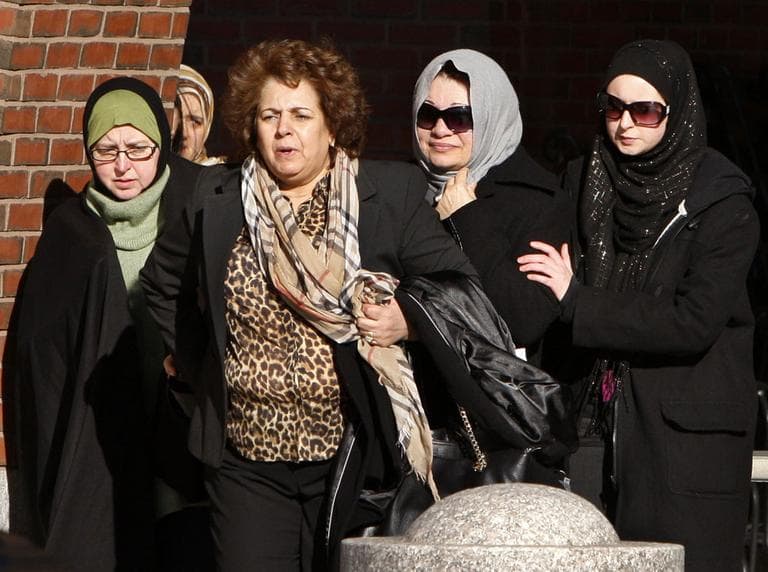Advertisement
Mehanna Found Guilty In Terrorism Trial

Tarek Mehanna, at age 29, may be spending the rest of his life in prison, following his conviction on charges of conspiring to support al-Qaida and to kill American soldiers in Iraq.
With dramatic and decisive speed, a federal jury in Boston on Tuesday found the Massachusetts College of Pharmacy graduate guilty on all seven counts.
The Sudbury resident has been at the center of what defense attorneys called an attack on the First Amendment, but what federal prosecutors say was the English language wing of al-Qaida on the Internet.
"The job of law enforcement agencies and prosecutors is to bring terrorists to justice," said U.S. Attorney Carmen Ortiz, who stood alongside her prosecutors and the FBI outside the federal courthouse to proclaim success in preventing terrorism before it happened.
What ended darkly for the defense began brightly.
"We all concluded that the government had not proven the picture of Tarek they wanted to present to that jury," said defense co-counsel J.W. Carney.
As the jurors began their deliberations, Carney and his partner Janice Bassil talked hopefully about the prospects of an acquittal in a building whose halls inspire hope, but whose courtrooms speak in cold statistics about outcomes that are stark indeed.
About 97 percent of all criminal cases that come here end in guilty pleas. And of those that go to trial, about 85 percent end in convictions.
In short order, with their expression of hope still echoing, the jurors came back with the jolt of a swift verdict consistent with the odds.
The Jury's Guilty Verdict
Mehanna kept his poise as a juror read, "We the jurors find the defendant guilty" — seven different times.
Mehanna kept his poise. His mother sobbed, then broke down in grief and needed to be carried from the courtroom.
Bassil wiped tears from her eyes, then joined Carney outside in bitter criticism of federal judge George O'Toole and "the extraordinary leeway that the prosecution was given to put inflammatory, prejudicial evidence day after day, week after week, that was really so important to the charges, that that evidence was never once mentioned during either prosecutors' closing argument," she said.
Carney complained about reference after reference to Osama bin Laden, photos of 9/11 and the Twin Towers. During the trial Carney had sarcastically asked one government witness if he wanted to go ahead and mention bin Laden yet one more time.
Advertisement
"Frankly, this was one of the most cynical government cases I have ever seen tried. Picture after picture, just wanting to scare the jury, deal after deal to government witnesses," Bassil said.
The government witnesses were Mehanna's friends and associates. They were given immunity or incentives to testify against Mehanna when they themselves might have had even more criminal culpability, like calling for the bombing of a North Attleboro shopping mall or shooting former U.S. Secretary of State Condoleeza Rice and former U.S. Attorney General John Ashcroft, the defense charged.
But Ortiz said that the evidence came not just from Mehanna's friends and conspirators but, "evidence that came from statements he made, statements that were recorded, evidence that was obtained from his computer."
Unable to find terrorist training in Yemen, Mehanna had come back to the U.S. intent on waging electronic jihad by translating al-Qaida videos and documents, the government said. His friends said that the boy who played baseball and Nirvana in the suburbs of Boston had wed himself to extreme ideology and to watching videos celebrating suicide bombings and beheadings.
"Once the government learned that Mr. Mehanna — of his intentions towards America, especially American soldiers, and his increasing radicalization, to have done nothing would have been inexcusable," Ortiz said.
His attorneys argued that Mehanna was a budding Islamic scholar who followed an independent path from al-Qaida, that his stated opposition to U.S. foreign policy and its wars was "independent advocacy," the expression of First Amendment rights.
Free Speech Vs. Supporting Terrorism
"It's a sad day for civil rights. It's a sad day for the First Amendment," Bassil said.
We don't prosecute people for expressing their rights to free speech, the U.S. attorney insisted.
But charging Mehanna with providing material support for terrorism on the basis of translations was considered the biggest reach of the Justice Department so far in its prosecution of alleged terrorists. That prosecutors won a slam dunk conviction after less than 10 hours of jury deliberation had defense attorneys saying this is an invitation for the Justice Department to reach even farther.
"The charges scare people," Carney said.
As Mehanna faces the prospect of a sentence to life in prison in connection with conspiracy to kill in a foreign country, his co-defendant in this trial is a fugitive because that man, Ahmed Abousamra, who clearly went to Yemen in search of terrorist training, was allowed to leave the U.S. in 2004.
"How concerned are you that his co-defendant was allowed to leave this country by government authorities. How concerned are you?" I asked Ortiz.
"I believe he is a fugitive right now and we have made efforts to pursue him," said Ortiz.
"I'll quibble with your characterization that he was allowed to leave," said prosecutor Aloke Chakravarty. "If you read the indictment, there was no criminal charge preventing him from leaving the United States, he's a United States citizen, he was allowed to go."
Yet the fact is that the co-defendant had already been interviewed by the FBI. And keeping him from leaving the country might have been a simple matter. After all, the FBI questioned Mehanna and then charged him with making false statements. But Abousamra got away, and Mehanna was the defendant who didn't.
More:
This program aired on December 21, 2011.
